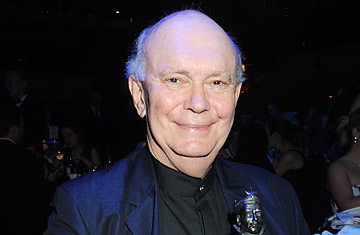
Sir Alan Ayckbourn
No theater artist has been sabotaged by praise more cruelly than Alan Ayckbourn. The British playwright was hailed in the 1970s for a string of comedies that, thanks to their abundant laughs and popularity in London's West End, got him dubbed the "British Neil Simon." That wildly inaccurate moniker stuck, even as Ayckbourn's early comedies, like Absurd Person Singular, gave way to increasingly dark and adventurous work — plays that were no longer surefire hits in London and in most cases never even got produced in the U.S.
So there's a bittersweet quality to the new Broadway revival of Ayckbourn's celebrated trilogy The Norman Conquests. First produced in 1973, it's one of his most grandly entertaining works: three plays that chronicle the same traumatic family weekend in an English country house from three vantage points — dining room, sitting room and garden. It is packed with laughs, brimming with stage tomfoolery (a character who leaves the dining room in one play shows up in the sitting room in the next) and staged superbly by Matthew Warchus, in a production first seen at London's Old Vic Theatre. (Richard Zoglin picks the 10 Ayckbourn plays that deserve revivals.)
But in some ways, it's a shame. The Norman Conquests is so damned funny (though grounded, as Ayckbourn's comedy always is, in real human emotion) that it may simply perpetuate the misconception of Ayckbourn as a skilled boulevard entertainer. Which would leave American audiences still largely ignorant of the astonishing body of work by — controversial-pronouncement alert! — the greatest living English-language playwright.
Even in his own country, Ayckbourn has never gotten the critical respect accorded contemporaries such as Tom Stoppard and David Hare. They write "important" plays about political issues or nuclear physics or Russian intellectuals. Ayckbourn's realm is more familiar: the domestic and romantic trials of modern middle-class Brits. Yet no one has probed more acutely, or with a finer balance of laughter and pain, the sad human comedy behind these tidy surfaces — the inability of people to connect, to see the casual cruelty they inflict on others, to come to terms with their failed illusions, to be happy.
He's a relentless experimenter. His plays might conflate the action in several rooms in one stage space or go backward in time or branch off into different permutations, but his formal ingenuity is matched by his ability to create incredibly vivid, fully realized characters who live on even after they've left the stage. The multiple perspectives prove it: Norman, the randy assistant librarian who puts the moves on two sisters-in-law, reveals new sides in each room, scene and play.
For this American fan, following Ayckbourn over the years has been a cycle of hope and frustration. First there's the trip to London to see each new Ayckbourn play, gems like Joking Apart (1978), in which a "golden couple" inadvertently destroy the lives of all who come in contact with them, and Man of the Moment (1988), his acidic satire of a former criminal turned media star — so prescient about the distorting mirror of reality TV — and Wildest Dreams (1991), his chilling black comedy about addicts of a Dungeons & Dragons — style fantasy game who lose touch with real life. Then the wait, often in vain, for a New York City production (his work turns up more often in regional theaters) or the dismay of seeing it done poorly by American actors.
Ayckbourn, 70, who is still going strong from his home base in Scarborough, England, despite suffering a stroke three years ago, looks with bemusement at the trouble Americans have staging his delicate mix of comedy and tragedy. "It looks pretty easy," he says, "but it sure as hell isn't. You've only got to tune it too far one way or the other." The new Norman Conquests is pitch-perfect. Can't anyone in America pick up the tune?
